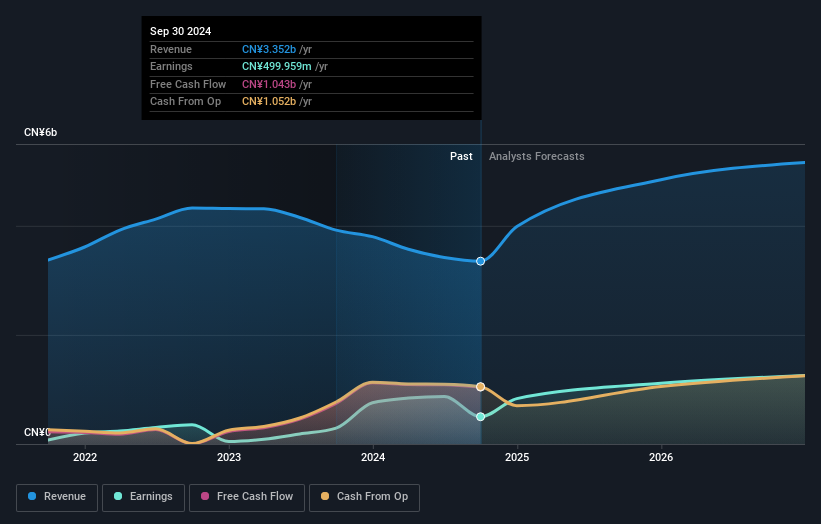- China
- /
- Electronic Equipment and Components
- /
- SZSE:300130
XGD Inc.'s (SZSE:300130) stock price dropped 14% last week; individual investors would not be happy

Key Insights
- Significant control over XGD by individual investors implies that the general public has more power to influence management and governance-related decisions
- The top 14 shareholders own 50% of the company
- Insiders own 38% of XGD
To get a sense of who is truly in control of XGD Inc. (SZSE:300130), it is important to understand the ownership structure of the business. And the group that holds the biggest piece of the pie are individual investors with 46% ownership. That is, the group stands to benefit the most if the stock rises (or lose the most if there is a downturn).
While insiders, who own 38% shares weren’t spared from last week’s CN¥2.2b market cap drop, individual investors as a group suffered the maximum losses
Let's delve deeper into each type of owner of XGD, beginning with the chart below.
See our latest analysis for XGD

What Does The Institutional Ownership Tell Us About XGD?
Institutional investors commonly compare their own returns to the returns of a commonly followed index. So they generally do consider buying larger companies that are included in the relevant benchmark index.
XGD already has institutions on the share registry. Indeed, they own a respectable stake in the company. This implies the analysts working for those institutions have looked at the stock and they like it. But just like anyone else, they could be wrong. When multiple institutions own a stock, there's always a risk that they are in a 'crowded trade'. When such a trade goes wrong, multiple parties may compete to sell stock fast. This risk is higher in a company without a history of growth. You can see XGD's historic earnings and revenue below, but keep in mind there's always more to the story.

Hedge funds don't have many shares in XGD. With a 29% stake, CEO Xiang Liu is the largest shareholder. In comparison, the second and third largest shareholders hold about 6.5% and 2.6% of the stock.
Looking at the shareholder registry, we can see that 50% of the ownership is controlled by the top 14 shareholders, meaning that no single shareholder has a majority interest in the ownership.
While studying institutional ownership for a company can add value to your research, it is also a good practice to research analyst recommendations to get a deeper understand of a stock's expected performance. There are plenty of analysts covering the stock, so it might be worth seeing what they are forecasting, too.
Insider Ownership Of XGD
While the precise definition of an insider can be subjective, almost everyone considers board members to be insiders. Company management run the business, but the CEO will answer to the board, even if he or she is a member of it.
Most consider insider ownership a positive because it can indicate the board is well aligned with other shareholders. However, on some occasions too much power is concentrated within this group.
Our information suggests that insiders maintain a significant holding in XGD Inc.. It has a market capitalization of just CN¥13b, and insiders have CN¥5.1b worth of shares in their own names. That's quite significant. Most would be pleased to see the board is investing alongside them. You may wish to access this free chart showing recent trading by insiders.
General Public Ownership
With a 46% ownership, the general public, mostly comprising of individual investors, have some degree of sway over XGD. While this group can't necessarily call the shots, it can certainly have a real influence on how the company is run.
Next Steps:
While it is well worth considering the different groups that own a company, there are other factors that are even more important. Consider for instance, the ever-present spectre of investment risk. We've identified 3 warning signs with XGD (at least 1 which doesn't sit too well with us) , and understanding them should be part of your investment process.
But ultimately it is the future, not the past, that will determine how well the owners of this business will do. Therefore we think it advisable to take a look at this free report showing whether analysts are predicting a brighter future.
NB: Figures in this article are calculated using data from the last twelve months, which refer to the 12-month period ending on the last date of the month the financial statement is dated. This may not be consistent with full year annual report figures.
New: AI Stock Screener & Alerts
Our new AI Stock Screener scans the market every day to uncover opportunities.
• Dividend Powerhouses (3%+ Yield)
• Undervalued Small Caps with Insider Buying
• High growth Tech and AI Companies
Or build your own from over 50 metrics.
Have feedback on this article? Concerned about the content? Get in touch with us directly. Alternatively, email editorial-team (at) simplywallst.com.
This article by Simply Wall St is general in nature. We provide commentary based on historical data and analyst forecasts only using an unbiased methodology and our articles are not intended to be financial advice. It does not constitute a recommendation to buy or sell any stock, and does not take account of your objectives, or your financial situation. We aim to bring you long-term focused analysis driven by fundamental data. Note that our analysis may not factor in the latest price-sensitive company announcements or qualitative material. Simply Wall St has no position in any stocks mentioned.
About SZSE:300130
XGD
Researches, develops, manufactures, sells, and services payment terminals in China and internationally.
Flawless balance sheet slight.
Similar Companies
Market Insights
Community Narratives



